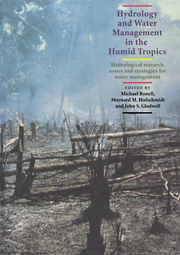 Hydrology and Water Management in the Humid Tropics
Hydrology and Water Management in the Humid Tropics Published online by Cambridge University Press: 23 December 2009
ABSTRACT
This chapter outlines some of the research developments in process hydrology within the humid tropics. Several gaps in research will be identified. Consequently, a considerable proportion of the chapter will consider technology-transfer of various methodologies and research findings from other climatic regions which may be either appropriate for application or need further testing in various humid tropical environments.
The chapter will systematically review process research connected with the water balance components: rainfall, evaporation, unsaturated zone (soil water), groundwater and runoff generation. Later, the effect of land-use impacts on some of the water balance components will be considered and an evaluation will be made of some “physically-based” modelling techniques which have potential for application in land management issues. Throughout this review, the meteorological and climatological linkages with process hydrology at different scales will be emphasized. Such linkages will particularly emerge during a consideration of recent progress and documentation of future planned “macrohydrology” projects connected with this climatic region.
INTRODUCTION
Since the 1960s, considerable progress has been made in process hydrology research in the temperate latitudes (e.g. Anderson & Burt, 1990; Calder, 1990; Ward & Robinson, 1990). In comparison, the humid tropics has received less attention, mostly for social and economic reasons (Bonell, 1991b, c). The last decade, however, has witnessed an upsurge in world-wide concern over the environmental consequences of converting tropical forests to other land uses. Part of this environmental debate has focused on the hydrological and climatic changes emanating from forest clearance, most notably related to the Amazon Basin because it is one of four major energy (latent heat) sources to the global circulation of the atmosphere (see Molion; Manton & Bonell, this volume).
To save this book to your Kindle, first ensure [email protected] is added to your Approved Personal Document E-mail List under your Personal Document Settings on the Manage Your Content and Devices page of your Amazon account. Then enter the ‘name’ part of your Kindle email address below. Find out more about saving to your Kindle.
Note you can select to save to either the @free.kindle.com or @kindle.com variations. ‘@free.kindle.com’ emails are free but can only be saved to your device when it is connected to wi-fi. ‘@kindle.com’ emails can be delivered even when you are not connected to wi-fi, but note that service fees apply.
Find out more about the Kindle Personal Document Service.
To save content items to your account, please confirm that you agree to abide by our usage policies. If this is the first time you use this feature, you will be asked to authorise Cambridge Core to connect with your account. Find out more about saving content to Dropbox.
To save content items to your account, please confirm that you agree to abide by our usage policies. If this is the first time you use this feature, you will be asked to authorise Cambridge Core to connect with your account. Find out more about saving content to Google Drive.